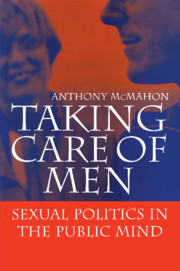Conclusion: Waiting for the Man
Published online by Cambridge University Press: 05 October 2010
Summary
People must work to maintain daily life; some work harder than (and work for) others, and some reap the benefits. This applies to both paid and unpaid work. I have argued that much ‘progressive’ thinking about men, both academic and otherwise, avoids, downplays, explains away or mystifies inequities in the organisation of domestic work at the level of description and at that of explanation. The principal tendency of the social conversation about men and change is, I conclude, to take care of men's interests, as women themselves care for men under the division of labour. The imperative to take care of men appears very strong.
In the discourse about men this is done by explicitly or implicitly denying men's interests and agency in the sexual division of labour and by discussing change in overly optimistic terms, with a promise of happiness through marriage. It also works through a series of significant rhetorical confusions between pleasure and performance, between emotion as feeling and emotion as doing, between gendered personality orientations and gendered jobs. Underlying all these is the inability to distinguish between consumption and production, something very characteristic of the present era.
My argument has taken the form of a critique of ideology – a critique of the way thought masks and thus protects the interests of the powerful. Critiques of ideology are as unfashionable as is the kind of materialist analysis I have relied on, but current fashions in social theory deserve ideological criticism themselves: the theoretical denial of interest suits the interested parties very well.
- Type
- Chapter
- Information
- Taking Care of MenSexual Politics in the Public Mind, pp. 203 - 206Publisher: Cambridge University PressPrint publication year: 1999

